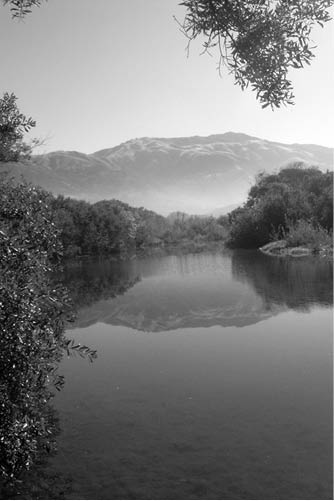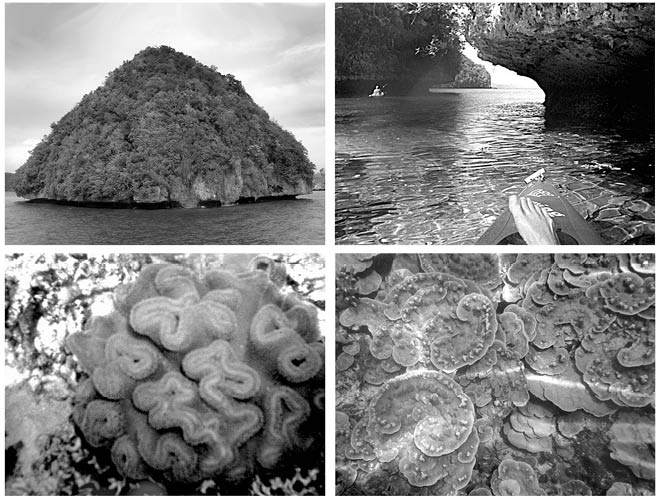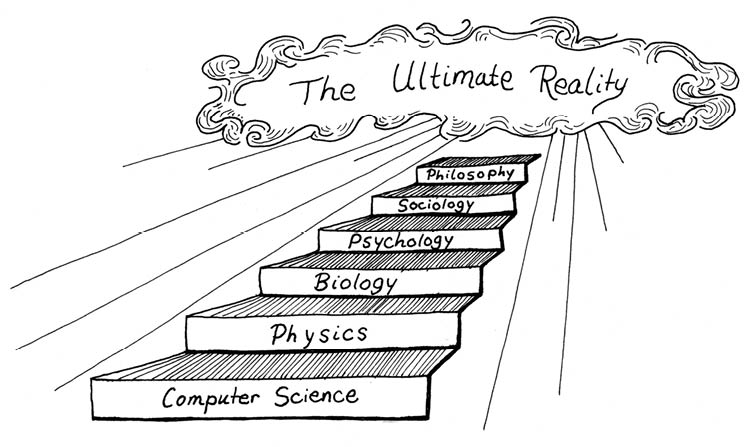What is Reality?
Is reality just one kind of thing, or is it many kinds of things? That is, do we believe in “monism” or in pluralism?
If we go for monism, can we really suppose that everything in our world is a type of computation? It doesn’t always feel as if such a “universal automatism” is the whole answer. That is, I don’t always believe that everything is a computation.

Pool at the Mouth of the Big Sur River
I had a moment of disbelief while finishing the first draft of my tome on the meaning of computation: The Lifebox, the Seashell and the Soul. This was in 2014. I went camping in Big Sur with my wife, Sylvia; it was a hot day, and I had the chance to stand in the cool clear flow of the Big Sur River, up to my neck in a big pool that accumulates right before the river flows across a sand bar into the Pacific.
Standing there, I closed my eyes to savor the sensation of water and air. My arms were weightless at my sides, my knees were slightly bent, I was at perfect equilibrium. Each time I exhaled, my breath would ripple the water, and reflections of the noon sun would flicker on my eyelids. Exquisite—and, no, I wasn’t high; I haven’t been high since I was fifty.
I was all there, fully conscious, immersed in the river. And I became powerfully aware of a commonsense fact that most readers will have known all along.
“This isn’t a computation. This is water.”
So is monism wrong? It’s not that I think it’s a waste of time expending energy in trying to believe everything is a computation. It’s not that universal automatism is necessarily wrong. It’s more that, at times, it becomes too cumbersome a way to try to think of things. Like any scientific monism.
Why pretend that reality is any less rich than you know it to be? I’d still include computation as one of types of things that exist. But I’d want to include the sense of the All, and love, and the body. And water. And the reflections in my brass desk lamp. And crows. And…
Once you move past monism, the next logical stopping point is the most comprehensive possible pluralism.
• Reality is endlessly diverse.
But wait. Did I just say that I don’t believe everything’s a computation? I’m abandoning one the main points that I was arguing for during the whole length of The Lifebox, the Seashell, and the Soul? Come on, Rudy!

Snapshots from Micronesia, Left to right and top to bottom: a rock island near Palau, kayaking along the edge of a rock island, a soft coral whose shape is a disk with a fractally folded edge, Zhabotinsky-scroll hard coral.
Well, okay, maybe I don’t want to pull back too far from universal automatism. Even though it’s wearisome to continually view the world as being made of computations, this particular monism could really be true.
There was in fact one specific moment a year later, in 2015, when I came back into the fold of monistic universal automatism. Itw during a kayak excursion in Micronesia. I’ll quote from my journals.
Yesterday I went on a kayak tour in the rock islands of Palau. It was one of the best days of my life.
Our guides were three Palauans: Jake, Ding, and Rayna. They were great: wild lively locals, talking rapid-fire Palauan to each other all day. Jake was the very image of the old-style Micronesian chief, although later I found out he’d gone to college, started a career as an accountant, and had thrown that over to be a tour guide.
There were five of us tourists. The guides loaded five single-seat hard kayaks on a boat and motored out to our starting point. For the rest of the day, we kayaked in stages: we’d get to a location and the motor boat would be waiting there, we’d tie our kayaks to the boat, go snorkeling, climb up the ladder to the motor boat, replenish our supplies, and then remount our kayaks. Jake had six waypoints for us: a hidden underwater tunnel leading to a tree-lined lagoon filled with giant clams, a sunken ship from the 1930s, a little point where he speared a fish, a large lagoon with a beach where we had lunch, an underwater tunnel leading to a cave filled with blue light coming up from the water, and an arch connecting two bays with soft corals growing on the sandy bottom of the arch.
Coming into the lagoon for lunch I felt quite weightless; the water was so clear and unrippled, and the sand below it so white. It was as if my kayak were gliding through empty space. And quiet, quiet, quiet all around. Not a whisper of wind in the trees, only the gentle lapping of the waves, the occasional calls of birds and, of course, the sporadic whooping of the Palauans. I had such a wave of joy, wading around that lagoon, and a profound sense of gratefulness, both to the world for being so beautiful and to God for letting me reach this spot. I had another wave of these feelings a bit later when we were kayaking through a maze of small islands in shallow water, bays that no motor boat could reach. Peaceful, peaceful. Eden. The world as it truly is meant to be. I’m glad I lived long enough to get here.
High in the air above one of these sunny backwaters, I see a large dark—bird? It’s the size of an eagle, and, no, it’s a fruit bat, the sun shining through the membranes of its wings. The islands look like green clouds come to earth; mirroring their fluffy white brethren above.
In the last snorkel spot there are lovely pale blue and pink soft corals, branching alveolar broccolis on the sandy bottom of the archway connecting two bays. Fractals, in short. Swimming through the arch, I encounter a shoal of maybe ten thousand tiny tropical fish, like the fish you’d see in someone’s home aquarium, little zebras or tetras. With my snorkel on, I marvel at their schooling motions, their bodies moving in a unison like iron filings in a field, their ropes and scarves of density emerging from the parallel computation of their individual anxieties. The turbulent water currents compute, as do the clouds in the sky, the cellular automaton reaction-diffusion patterns on the mantles of the giant clams, the Zhabotinsky scrolls of the shelf corals, the gnarly roots of plants on the land.
And I’m thinking that maybe, yes, maybe after all everything is a computation. Universal automatism gives me a point of view from which I can make sense of all these diverse forms I’m seeing here. Maybe I was wrong to want to “take it all back” in September. But what about my thoughts, can I see those as computations, too? Well, why can’t they just be fractal broccoli, flocking algorithms, class four turbulence, cellular automaton scrolls. I ascribe higher significance to them, but why make so much of them. Are my thoughts really so vastly different from the life forms all around me in these lagoons? Why not relax and merge. All is One.
And if I find it useful to understand the One’s workings in terms of computation, don’t think that this reduces the lagoon to a buzzing beige box. The lagoon is not reduced, the lagoon is computing just as it is. “Computing” is simply a way to speak of the dance of natural law.
So, okay, I’ll go for the universal-automatist answer to “What is reality?”
• Reality is made of gnarly computations.
Now to the next question.
The Meaning of Life
One appeal of monistic philosophies is that if we can reduce reality to one substance, there’s some hope of finding a rule of behavior for that substance, and that rule may suggest a meaning for the world.
Let’s see how this works if we believe in universal automatism. If I say that everything is a computation, I’m saying that everything is a deterministic process. And that means that reality is a weave of logical if-then statements, with each phenomenon linked to a cause. As an extreme example of universal automatism, there might be some underlying supercomputation that generates not only the entire cosmos but also the underlying fabric of space and time. But then, of course, we’d have to ask why that particular supercomputation exists.
The point here is that even if the world is the result of a supercomputation, knowing this isn’t much use to us. We still wouldn’t know where the supercomputation came from. And—perhaps even more important, we still wouldn’t know what it’s for.
And that, after all, is really what we’re after when we ask about the meaning of life. It’s not so much the cause that’s puzzles us as does the purpose.
Does a person’s life have a purpose?
Again we can turn to Stephen Wolfram’s classification of computations into four classes. Class one processes do nothing, and stay at one fixed point. Class two processes repeat themselves in a loop. Class three processes are random, patternless scuzz. Class four processes are richly, chaotically patterned. I call them gnarly.
So in terms of the meaning of a life, universal automatism suggests a possible answer. Computationally rich “class four” or “chaotic” or “gnarly” behaviors are in an objective sense more interesting than those that die out, repeat, or have no discernible structure. So a universal automatist might say that the meaning/purpose of a human life is to produce a gnarly class computation!
The human artifacts we admire are computationally rich. An empty canvas is class one. Hack artwork is class two copying of existing artifacts. Ugly scuzz is class three. Great art is class four: gnarly.
The nobler emotions are computationally rich as well. Murderous rage forces some victim’s computation into class one termination. Hatred throws the hater into a class two loop. Too needy a desire to please puts a person at the mercy of capricious class three inputs. Compassion is an ever-evolving class four process.
Get the picture?
• The meaning of life is beauty and love.
One more question.
How to Be Happy
I’ll offer a bouquet of six answers—one for each of the six levels of reality I discuss in The Lifebox, the Seashell and Soul..
 Drawing by Isabel Rucker.
Drawing by Isabel Rucker.
After slong and complex mental computations, I’ve compressed my six answers to a couple of words apiece. A to-do list.
• Turn off the machine. Universal automatism teaches us that there’s a common ground upon which to compare nature to PCs. But this doesn’t mean that that PCs are as good as reality. Far from it. On the common ground, we can readily see that the natural world is incalculably more powerful and interesting than the odd flickering boxes we’re wedded to in the Y2K era. I try not to let them run my life.
• See the gnarl. The air is a gnarly ocean; the leaves dance on the trees. I’ve always enjoyed watching clouds and water; and now I realize that the computations they’re carrying out are fully as complex as anything in any book I might read. Each flickering shadow is a reminder of the world’s unsolvable and unpredictable richness.
• Feel your body. There’s always something interesting to feel in this wonderful meat computation that I’m privileged to inhabit. It’s fun sometimes to think of my body as being very large—like an immense starship that I’m inside. I can focus on the inputs from all the different parts. Meanwhile my breath and heartbeat are gently chaotic. As a heavy computer user, I need to remember not spend more time upgrading my machine than I do in exercising my bod.
• Release your thoughts. Underneath the wanting and worrying is the great river of thought. I don’t control much of the world, and things rarely turn out as I predict, so why waste my time in focusing on fears, desires, and expectations? And why invest all my energy in logic which, as we now know, only goes so far? Released from the class two channels of attachment, I can watch my mind like fireworks above a wavy sea.
• Open your heart. People are the most interesting and beautiful entities I’ll ever see. Society isn’t about the news and the leaders. It’s about the people I run into every day. Recently I saw a show of photographs by Diane Arbus. Diane must have been such a character. She had a way of getting to the essential humanity of her subjects—ordinary people lovingly depicted and made fully human in all individuality. They always seem to be as interested in Diane as she is in them. People sense when you look at them with utter interest and compassion; they look back and smile.
• Be amazed. Our studies of computation teach us that none of our theories will ever get very far. Not everything can be explained, nor even expressed in words. We’re fully immersed in the incomprehensible. Life is a mystery; it’s good to savor this.
Lest this list seem preachy, let’s say the advice is actually aimed at me. I need it. I forget the simplest things.
And I’m glad to see these slogans emerge from my long and gnarly chains of reasoning. They’re a nice place to end up.
One last thought: perhaps our universe is perfect.
[Check out the whole book, The Lifebox, the Seashell, and the Soul.]









December 16th, 2021 at 11:21 am
“This isn’t a computation. This is water.”
Nah, I’m perfectly happy to experience water as the coarse-graining that my sensory organs impose on an insanely complex computation of ‘atoms of space’, as Wolfram would call them.
December 16th, 2021 at 12:42 pm
Computers can’t handle infinite precision real numbers. In a simulation with finite precision, a photon traveling in infinite, empty space would eventually deviate from a straight line. This would be visible as a kind of pixelation. Astronomers have not observed any pixelation of light from stars. We could hypothesize that we are in a simulation with finite precision, with just enough precision to avoid pixelation, given the finite size of the universe. But Occam’s razor would advise us to simply say that, since there is no observed pixelation, there is no reason to believe that reality is constrained to finite precision numbers. The simplest hypothesis is that the universe is not computable.
Related: https://www.symmetrymagazine.org/article/holometer-rules-out-first-theory-of-space-time-correlations
December 16th, 2021 at 12:52 pm
JG, I get what you’re saying…we can’t notice the tiny “pin pricks” of the atoms, and we just imagine the water is smooth. But I like to imagine that, at some deep psychic level, I’m really touching the continuous essence of water. All we have, in the end, is our sensations and our feelings, and maybe there’s room to jibe those with the atoms-and-quanta story.
Good point, Peter. But I’m using natural computation in a fairly broad sense of law-like behavior, and I’m not insisting that nature has to be digital. Analog computations are fine. Indeed, my natural inclination is to think that reality really IS continuous. Dreaming of science getting past the quantum stumbling block one of these days. 🙂
December 16th, 2021 at 1:44 pm
May be of interest:
https://en.wikipedia.org/wiki/Real_computation
“In computability theory, the theory of real computation deals with hypothetical computing machines using infinite-precision real numbers. […] If real computation were physically realizable, one could use it to solve NP-complete problems, and even #P-complete problems, in polynomial time. Unlimited precision real numbers in the physical universe are prohibited by the holographic principle and the Bekenstein bound.”